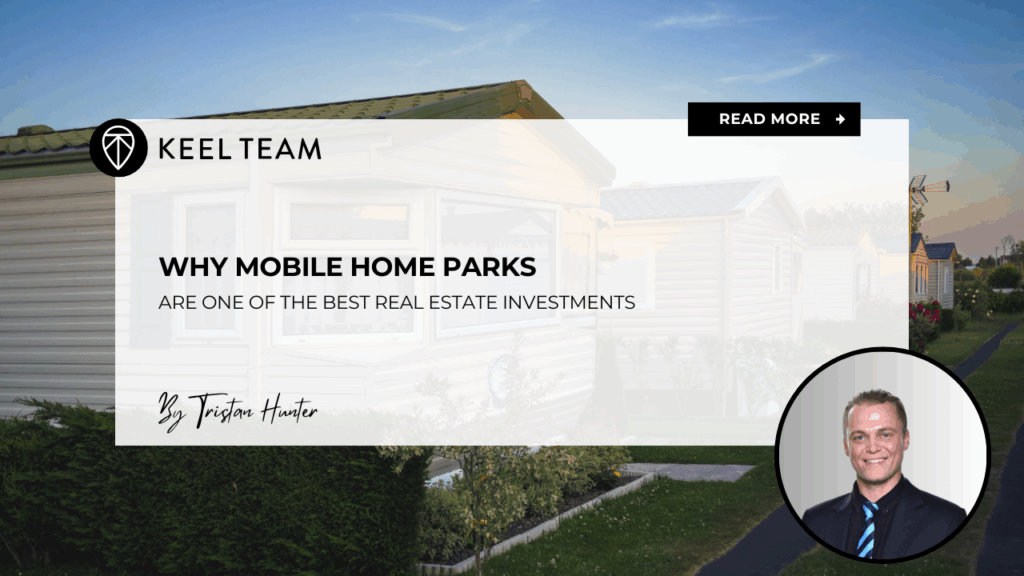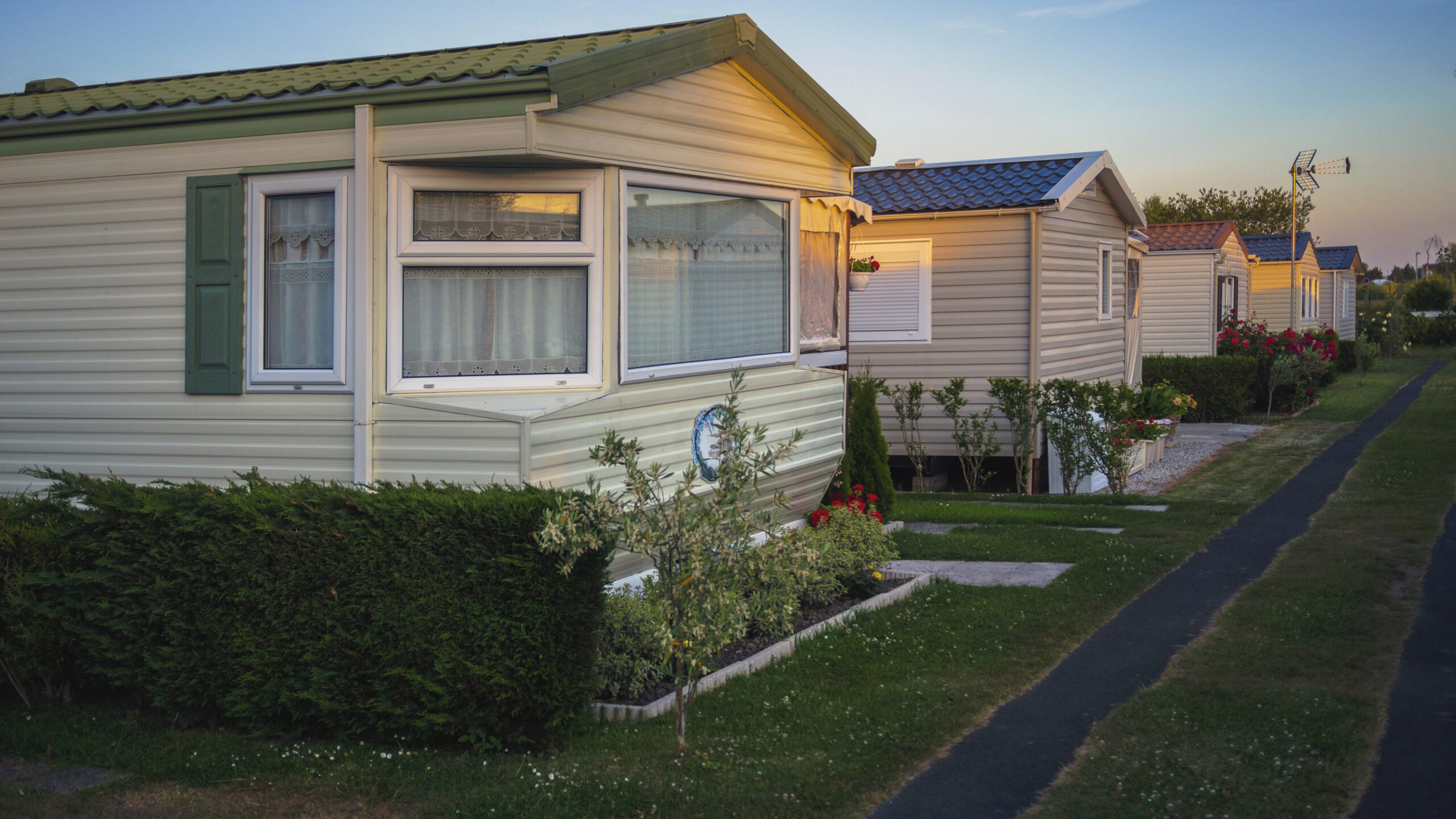Why Mobile Home Parks Are One of the Best Real Estate Investments
-
 Tristan Hunter - Investor Relations
Tristan Hunter - Investor Relations

Mobile home park investing has gained significant attention over the past decade. More investors are looking for cash-flowing assets that can weather economic shifts, and mobile home parks often show up at the top of that list. While no investment is without risk, mobile home parks may offer a compelling combination of stability, returns, and demand that’s hard to ignore.
Let’s explore why trailer parks are becoming a go-to strategy for real estate investors.
What Makes Mobile Home Parks Stand Out?
Low Cost Per Unit
Compared to other real estate asset classes, trailer parks often have the lowest cost per unit. That’s because in many mobile home parks, the investor doesn’t own the homes—just the land. Residents typically own their homes and pay lot rent to the owner. This model can keep capital expenses low and limit exposure to maintenance issues that come with traditional housing.
In many cases, the cost to acquire a mobile home park with 50–100 occupied lots can be lower than purchasing a 10–20 unit apartment complex in the same market.
Steady Demand for Affordable Housing
The demand for affordable housing continues to rise. Many working-class families, retirees, and fixed-income households are getting priced out of traditional housing options. Trailer parks may serve this need better than nearly any other product type in the housing market.
Because mobile homes can provide low-cost, detached housing in a community environment, they’re often in high demand. This demand doesn’t seem to drop off significantly during economic downturns either, which is part of why they are considered relatively recession-resilient.
Limited New Supply
Mobile home parks are not being built at scale anymore. Local zoning restrictions, community resistance, and the economics of land development make it challenging to bring new properties to market.
This limited supply adds scarcity to the asset class. For investors, that could mean less competition and more pricing power over time, especially in areas where manufactured housing is in high demand but no new inventory is being added.
Download our FREE eBook on the Top 20 things to know BEFORE investing in mobile home parks!
Operational Advantages of Mobile Home Parks
Tenant-Owned Homes
One of the biggest differences between mobile home parks and other residential real estate is who owns the structures. In many cases, tenants own their mobile homes and simply rent the land beneath them. This creates several operational advantages:
- Lower maintenance costs: Since the tenant owns and maintains the home, the mobile home park owner isn’t responsible for fixing plumbing, HVAC, roofing, or interior wear and tear.
- Less turnover: When residents own their homes, they’re less likely to move. Moving a mobile home can cost several thousand dollars, and many are not relocated once installed. This can lead to more stable occupancy.
- Improved collections: People who own their homes may be more motivated to stay current on rent. While this isn’t always the case, homeownership can contribute to a stronger payment history.
Scalability
Trailer parks are often larger than other residential assets. Instead of buying one property with 8–20 doors, you might acquire a mobile home park with 50, 100, or even 200 lots. This can provide greater scalability from a management, revenue, and systems standpoint.
Once systems are in place—whether it’s billing software, maintenance teams, or management procedures—they can be scaled across a higher number of units, often increasing efficiency.
Potential for Strong Cash Flow
Manufactured housing communities have historically produced solid cash flow relative to purchase price. Because of lower per-lot costs, reduced maintenance responsibilities, and stable rent collections, they may generate a higher net operating income compared to other property types with similar acquisition costs.
Many investors also see mobile home parks as an opportunity to improve underperforming assets. Common value-add strategies include:
- Filling vacant lots
- Raising under-market rents gradually
- Billing back utilities
- Improving roads or infrastructure to attract better tenants
These improvements can help increase income and overall property value without significant capital expenditures on housing units.
Favorable Demographic Trends
An Aging Population
As Baby Boomers retire, many seek affordable, low-maintenance housing options. Mobile home parks can provide just that, especially in warmer climates. Senior-friendly mobile home parks that offer quiet communities, safety, and cost savings continue to attract retirees who prefer to own rather than rent.
Rising Home Prices
Traditional single-family home prices have increased sharply in many markets. That trend has made mobile homes and mobile home park living a more attractive alternative for budget-conscious families. First-time homebuyers, single parents, and blue-collar workers are increasingly turning to mobile homes as a path to homeownership.
Mobile home parks offer a unique value proposition in this market, making them more likely to benefit from housing affordability constraints across the country.

Why Mobile Home Parks May Be Recession-Resilient
Mobile home parks tend to perform well even during times of economic uncertainty. This is largely due to the affordability of lot rents. When economic hardship hits, people tend to cut expenses—and housing is one of the biggest areas of focus.
Moving from a high-rent apartment to a mobile home can cut housing costs significantly without sacrificing personal space or privacy. Because of this, mobile home parks often maintain high occupancy and strong collections even when other property types face higher vacancy or non-payment rates.
Government Support and Stability
While policies vary by state and municipality, mobile home parks often benefit from government programs or policies aimed at preserving affordable housing. In some cases, this includes tax credits, grants, or incentives for maintaining or improving communities.
Additionally, some states have legal frameworks that make it difficult to redevelop or displace mobile home park residents, which can make the income more stable over the long term. That said, every market is different, and it’s important to understand local laws before investing.
Investor Considerations
Due Diligence Is Critical
Not all mobile home parks are created equal. It’s important to carefully evaluate each investment, especially in areas like:
- Utility infrastructure (private vs. public)
- Market demand and local employment
- Tenant base and payment history
- Compliance with zoning and regulations
- Deferred maintenance and capital needs
Getting good data on occupancy, utility setups, and management can be more challenging in mobile home parks compared to other real estate assets, so thorough due diligence is key.
Management Requirements
Mobile home parks often require hands-on management, especially if you’re purchasing a value-add property. Dealing with collections, move-ins, tenant relations, and vendor coordination can be time-consuming. Some investors choose to hire professional property managers who specialize in mobile home parks, while others build in-house teams.
The level of management depends on the asset, but it’s important to plan for these responsibilities from the beginning.
Financing Is Unique
Mobile home park loans are different from standard residential or multifamily loans. Many banks still view mobile home parks as niche assets. Loan terms can vary widely depending on whether the park has public utilities, paved roads, and high occupancy.
While financing is available through agencies, regional banks, and private lenders, each lender has specific underwriting criteria. Working with a broker who understands the mobile home park space can help smooth the process.
Conclusion
Mobile home parks are gaining recognition for a reason. Their affordability, stable demand, and operational efficiencies make them an attractive asset class for many real estate investors. While no investment is risk-free, mobile home parks offer a unique combination of cash flow potential, supply constraints, and demographic support that’s hard to find elsewhere in real estate.
Investors willing to do the work—whether that’s due diligence, management, or market research—may find that mobile home parks offer opportunities that outperform more traditional property types. As always, each deal stands on its own, and careful evaluation is essential.
If you’re considering diversifying your portfolio with a different kind of real estate investment, mobile home parks may be worth a closer look.
Are you looking for MORE information? Book a 1-on-1 consultation with Andrew Keel to discuss:
- A mobile home park deal review
- Due diligence questions
- How to raise capital from investors
- Mistakes to avoid, and more!
Disclaimer:
The information provided is for informational purposes only and is not investment advice or a guarantee of any kind. We do not guarantee profitability. Make investment decisions based on your research and consult registered financial and legal professionals. We are not registered financial or legal professionals and do not provide personalized investment recommendations.

Tristan Hunter - Investor Relations
View The Previous or Next Post
Subscribe Below 👇





